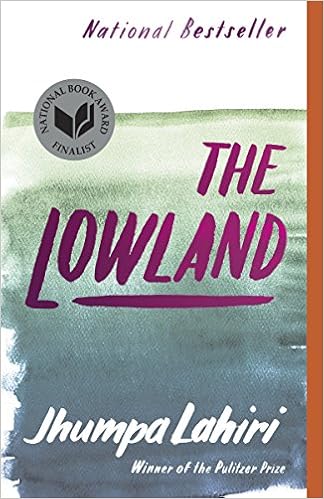3 Stars
 I chose this book because it was shortlisted for the Man
Booker Prize and was a finalist for the National Book Award, but I was
disappointed with it. It left me cold.
I chose this book because it was shortlisted for the Man
Booker Prize and was a finalist for the National Book Award, but I was
disappointed with it. It left me cold.
Two Bengali brothers grow up in Calcutta in the 1960s and
‘70s. Though emotionally close, they are very different and choose different
paths. Subhash, the elder, is cautious and strives “to minimize his existence,
as other animals merged with bark or blades of grass,” while Udayan is daring
and “blind to self-constraints, like an animal incapable of perceiving certain
colors” (11). Subhash becomes a scientist who emigrates to the U.S. while
Udayan becomes involved with a radical political group and defies his family by
marrying Gauri, an independent-thinking woman. Udayan’s decision to take part
in violent acts of insurrection has a devastating impact on his family, as does
Subhash’s decision to “rescue” his sister-in-law from a “joyless house” (115).
The majority of the novel is a long and painful examination of the consequences
of these decisions.
My disappointment with the book stems from its characters;
it contains a cast of not very interesting characters. Subhash has the positive
traits: he is responsible, loving, and capable. Unfortunately, he is dull. The
charismatic brother is irresponsible and selfish; by his own admission, he lies
to and manipulates those he loves. “Udayan had given his life to a movement
that had been misguided, that had caused only damage, that had already been
dismantled. The only thing he’d altered was what their family had been” (115).
Gauri is the least sympathetic character. She suffers from
what could be called Post Traumatic Stress Disorder but her thoughts are not
given in sufficient depth. Two-thirds of the way through the novel, she makes a
decision regarding her family which seems inappropriate for someone suffering
from grief and guilt and which removes any sympathy a reader might have felt.
Even when she is first introduced, she doesn’t behave as one would expect a
person intelligent enough to study philosophy to behave. For example, she
agrees to help Udayan by passing on information to sympathizers and by
observing the movements of a policeman, but never really questions the
significance of what she is doing: “She wondered exactly how she was contributing”
(292). Her ambivalence left me feeling ambivalent towards her.
All of the characters seem to experience feelings of
isolation and not belonging. Subhash feels “doubly alone. Unable to fathom his
future, severed from his past” (63). Gauri always feels like a foreigner (236).
These feelings are understandable; the problem is that other feelings are never
really examined so the characters feel flat. Furthermore, characters don’t
evolve: they never express their emotions to those they love, and they don’t
grow. Gauri has some insights about herself (242), but they are long in coming.
Having harped about characterization, I must admit that the
novel does develop worthy themes. For instance, there are discussions of time
and memory (151 – 152). Unfortunately, the weak/superficial characterization
overshadows the novel’s strengths.
No comments:
Post a Comment